(完整版)新版新目标七下Unit2Whattimedoyougotoschool知识点及习题
人教新目标七年级下册Unit2 What time do you go to school Sect

T eaching PlanUnit2What time do you go to school?SectionA1a-2dⅠ.Language goals:1.V ocabulary:dress,up,brush,tooth,shower,usually,early,station,funny,exercise2.Phrases:g e t up,dr essed up,g e t dressed,brush the teeth,take a shower,radiostation,eat breakfast3.Sentences and structures:-What time is it?-It’s…T eaching goals: T eaching important points:-What time do you usually…?-I usually….-What time d o es h e/sh e usually…?-He/She usually..(s/es)….II.Ability goals:1.T alk a bo u t routines;Ask a bo u t and say times.2.Improve the abilities of listening,speaking.3.Learn t o use the phrases and sentences of this part.III.Emotion goals:T o understand the importance of the time and making full use of time1.New words and expressions in this part.2.The routinesT eachingdifficult points:S tudents can talk a bo u t their routinesT eaching approaches: Learning T ask-based Language T eaching speaking,listeningapproaches:T eaching procedures:T eaching contents and the teacher’s activities S tudents’activitiessS tep One: Greeting1. Greet the students warmly ..2. Enjoy a son g abo u t the clock. S tep Two: Talk about time1. T: What time is it? S: It ’s eight o ’clock. (Ask several students a bo u t time.)2. Ask one student to be a clock and show us the time. S tep Three: Presentation1. -What do you usually do at 6:30? S: I usually …at …-What do I usually do at 6:30? Listen and guess. - Brush the t eethMotivate students t o g et into the class quickly.Use the new phrases to mak e sentences.2. Guess my morningListen and guess what I usually do in the morning.(get up, go t o work, g e t dressed, brush the teeth, take a shower).3. R ead the phrases loudly and r e me mber them. S tep Four: PairworkA: What time do you usually…?B: I us ually… at….Work in pairs and gr oups S tep Five: Groupworkt o practice the dialogueA: What time does he/she usually …?B: He/She usually –(s/es) up at…. S tep Six: Oral English1. I talk about my morning and then I ask students to talk about their own morning.I g e t up at 6:30. I brush my teeth at 6:35. I take a shower at 6:40. I eat breakfast at 7:00. I g e t dressed at 7:20. I go to work at 7:30. 2. Ask student to talk about Mrs W ang ’morning. Mrs Wang gets up at 6:30. She brushes the teeth at 6:35. She takes a shower at 6:40.She eats breakfast at 7:00. She getsdressed at 7:20. She g o es t o work at 7:30. S tep Seven: Listening practice1. Listen and mat ch the times with the actions. Draw lines from the clocks t o the pictures. (1b)2. Listen to the conversation. Complete the sentences.(2a)3. Listen again. Complete this shower schedule for Jim’s family.(2b)S tep Eight: ConversationS tudents can use the important sentence pattern to talk a b o u t their own morning and other ’s morningListen and fill in the blanks1R ead the conversation in2d loudly and quickly,then fill in the Discussion blanks.2.Role-playAsk two students t o imitate2d t o have an interview.Then show us it.Step Nine:Homework1.Make a survey with the drill“What time do e s your father/ mother g e t up/take a shower…?2.Design(设计)your ideal(理想的)day!Proverbs:•Time is life.R ead the conversation and give students the performanceR emember the importance of the time•Time is money.•All time is no time when it is past.•Every second counts.Unit2What time do you go to school?1.--What time do you usually ge t up?--I g e t up at6:30.2.–What time d o e s he/sh e usually g e t up/…?--He/She gets up at6:30.gets dr essedeats breakfastg o e s to workbrushes the t eeth。
新目标英语七年级下册Unit-2-What-time-do-you-go-to-school-教案

Unit 2 What time do you go to school?Section A 1 (1a-2d)一、教学目标:1. 语言知识目标:1) 能掌握以下单词:up, get up, dress, get dressed, brush, tooth (pl. teeth) brush teeth, shower, take a shower, usually, forty, fifty, wow, never, early, job, work, station, radio station, o'clock, funny, exercise能掌握以下句型:①—What time do you usually get up? —I usually get up at six thirty.②—When do you go to work? —I usually go to work at eleven o'clock.③—He has an interesting job. —He works at a radio station.2) 用when和what time引导的特殊疑问句询问时间和时间的表达法;用所学的目标语言对生活和学习活动做计划,学会合理地安排作息时间。
2. 情感态度价值观目标:本部分的话题是“日常作息时间”,学习内容贴近学生的生活,因为学生的作息时间安排是非常有规律的。
通过互相询问或谈论自己或对方的作息时间安排和活动计划,可以培养学生良好的作息习惯和守时习惯。
二、教学重难点1. 教学重点:1) 掌握时间的简单表达方式。
2) 学习询问和谈论时间和制订作息时间表。
2. 教学难点:when和what time引导的特殊疑问句和时间的表达法。
三、教学过程Ⅰ. Warming-up1. Greet the Ss as usual.2. Present some sentences about time.Ⅱ. Presentation1. 出示一个可以转动时/分针的大钟,一边调整时间,一边询问学生时间“Whattime is it?”。
人教版新目标英语七年级下册《Unit 2 What time do you go to school

人教版新目标英语七年级下册《Unit 2 What time do you go to school》优质教学设计2一. 教材分析人教版新目标英语七年级下册《Unit 2 What time do you go to school》主要介绍了日常生活中的时间安排,包括起床、吃早餐、上学、放学、做作业、娱乐等活动。
本节课主要让学生学会询问和回答别人日常活动的时间,并能够用英语描述自己的时间安排。
教材内容贴近学生生活,有利于激发学生学习兴趣,提高学生英语表达能力。
二. 学情分析七年级的学生已经掌握了基本的英语语法和词汇,具备一定的听说读写能力。
但部分学生对英语学习仍存在恐惧心理,缺乏自信心。
此外,学生在生活中对时间的认识和安排各有不同,需要教师引导学生逐步养成良好的时间管理习惯。
三. 教学目标1.知识目标:学生能够掌握日常活动词汇,如sleep, wake up, get up,go to school等;学会用What time do you go to school?询问别人日常活动的时间,并能用英语描述自己的时间安排。
2.能力目标:学生能够听懂、会说、会读、会写日常活动相关的句子,提高英语表达能力;学会用英语询问和回答别人日常活动的时间。
3.情感目标:培养学生珍惜时间、合理安排时间的意识,养成良好的时间管理习惯。
四. 教学重难点1.重点:学生能够运用所学词汇和句型询问和回答别人日常活动的时间。
2.难点:学生能够用英语描述自己的一日生活,并在实际情景中灵活运用所学知识。
五. 教学方法1.任务型教学法:通过设定各种实际情景,让学生在完成任务的过程中运用所学知识,提高语言实际运用能力。
2.情境教学法:创设生活情境,让学生在真实的环境中感受和体验英语,激发学习兴趣。
3.激励性评价:注重鼓励学生,提高学生自信心,激发学生学习积极性。
六. 教学准备1.教材:人教版新目标英语七年级下册《Unit 2 What time do you go to school》。
英语人教新目标七年级下册(新)unit 2 Unit 2 What time do you go to school 课件

Running star
busy
Liu Xiang’s day源自ActivitiesTime
get up run have breakfast have P.E lesson eat lunch do sports exercise have dinner watch TV play computer games go to bed
3a
Read Jane’s message to her pen pal and write down what she does at these times. around = about prep.
Dear Mona, Thanks for your letter. Do you want to know about my morning? Well, I usually get up at around six fifteen. I do my homework at six thirty, and then I eat breakfast at around seven thirty. start /st ɑ : t/ v. 开始 At around eight o’clock , I go to school. School starts at nine o’clock. Please write and tell me about your morning. Love, write /rait/ v. 写 tell /tel/ v. 告诉 Jane
8:00 8:30 9:15 1:20 5:40 8:50 22:30
Liu Xiang’s weekend
新目标英语七年级下Unit 2 What time do you go to school

新目标英语七年级下Unit 2 What time do you go to school?教学设计教学目标:1.会运用读数法表达时间2.运用What time询问并回答作息时间安排3.合理安排时间养成良好的生活习惯教学内容及重点:1.掌握日常活动短语:get up,get dressed,brush teeth,take a shower,eat breakfast,go to school2.会表达时间3.运用下列句型:---What time do you usually get up?---I usually get up at six thirty.教学难点:What time 特殊疑问句教学准备:录音机、多媒体、导学案教学过程:一.情景导入1.问候2.课前展示3.目标展示二.新知探究1.导入:通过多媒体图片展示日常活动,检测预习情况。
2.游戏:3.T:It has no feet,but it can walk with its hands. It has no mouth,but it can speak to you .It says “Tick,tick and tick .”every day. What is it ?S:It is a clock.4.通过课件出示时钟,讲授时间表达法5.举一反三:出示更多的时间,让学生表达6.听力练习,连线三、巩固和拓展对话练习:1.一人扮演Rick,一人扮演记者,根据1a内容来询问Rick 早上的活动,完成1c2.运用三单形式进行问答四、作业布置写出自己早上的活动。
七年级英语下册Unit2Whattimedoyougotoschool教案新版人教新目标版
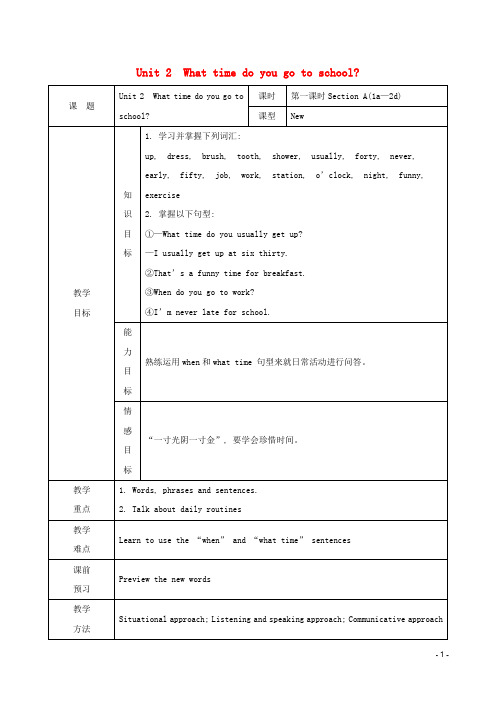
②When does Scott go to work?
③He always goes to work at seven o’clock.
能力目标
1.掌握What time及When特殊疑问句及其答语。
2.熟练使用频度副词
Summarize how to use what time to ask about their daily activities.
培养学生探究、归纳总结能力。
续表
教学环节
教师活动
学生活动
备课札记
Step 8
Consolidation
教师设置巩固检测练习:
Ⅰ.用所给词的适当形式填空
1. What time do you getdressed(dress) every morning?
2. Ss talk about themselves in pairs.
通过利用“信息差”进行口语结对活动,在交流信息过程中,进行真实的交际问答活动。
Step 6
Role-play (2d)
1. Let Ss read the conversation of 2d and answer the questions below.
2. Play the tape of2a.
3. Let Ss look at the chart of 2b carefully.
4. Play the tape of 2b.
1. Ss read the sentences in the box in2abefore listening to the tapபைடு நூலகம்.
人教版新目标英语七年级下册《Unit 2 What time do you go to school

人教版新目标英语七年级下册《Unit 2 What time do you go to school》教学设计3一. 教材分析人教版新目标英语七年级下册《Unit 2 What time do you go to school》主要围绕着日常生活中的时间安排展开。
本节课通过学习不同的时间表达方式,使学生能够灵活运用英语询问和描述日常作息时间。
教材内容丰富,包括对话、词汇、语法及任务型活动等,旨在培养学生的听说读写技能,提高他们的语言运用能力。
二. 学情分析七年级的学生已经掌握了基本的英语语法和词汇,具备一定的听说读写能力。
他们对新知识充满好奇心,善于模仿和交流。
但同时,部分学生可能对时间表达方式的掌握还不够熟练,需要教师的引导和练习。
三. 教学目标1.知识目标:学生能够掌握日常时间表达方式,如“What time do yougo to school?”、“I go to school at 7:00.”等;2.能力目标:学生能够在实际情境中运用英语询问和描述时间;3.情感目标:培养学生珍惜时间、合理安排作息的良好习惯。
四. 教学重难点1.重点:学生能够正确使用时间表达方式进行问答;2.难点:学生能够在实际情境中灵活运用时间表达方式。
五. 教学方法1.情境教学法:通过设定真实的生活情境,让学生在实际交流中学会运用时间表达方式;2.任务型教学法:设计各种任务活动,让学生在完成任务的过程中提高语言运用能力;3.互动式教学法:引导学生积极参与课堂互动,增强学生的自信心和合作精神。
六. 教学准备1.准备教材、课件和教学资源;2.设计相关任务活动和练习题;3.准备时间表、闹钟等教具。
七. 教学过程1.导入(5分钟)利用多媒体展示不同的时间场景,如早晨起床、上学、放学等,引导学生用英语描述这些场景。
2.呈现(10分钟)教师展示教材中的对话,让学生边听边跟读,掌握日常时间表达方式。
同时,教授时间词汇如“morning”、“afternoon”、“evening”等。
英语人教新目标七年级下册(新)unit 2 Unit 2 What time do you go to school课件

A: What time is it? B: It’s two o’clock. ten ten
ten past ten
2:00
10:10
5:15
five fifteen
a quarter past five
A: What time is it? B: It’s five o’clock.
take a shower go to school go to bed
eat dinner eat breakfast go home
eat lunch
Listen again and write the times next to the actions 1 . gets up 2 .runs 5:00 6:00 7:00 8:00 4:15 5:30 7:15 9:00
6:30
six thirty half past six
5:00
Hale Waihona Puke 7:45seven forty-five
a quarter to eight
What time do you usually …? I usually … at
get up
eat breakfast
What time do you usually …? I usually … at
What does Scott do?
Events
get up work get home go to bed
Time
17:00(5:00 pm) 19:15(7:15 pm) 7:00 am 8:30 am
Scott works very long hours. He usually gets up at 17:00. He has a shower and then eats his breakfast. What a funny time to eat breakfast! After breakfast he plays his guitar , then he goes to work. To get to work , he takes the number 17 bus to the Sai Te Hotel. The bus usually takes him to work at 19:15. He works all night. People love to listen to him! He gets home at 7:00, and he watches morning TV. He goes to bed at 8:30. Can you think what his job is? What is his job?
人教版新目标七年级英语下册 Unit2 What time do you go to school

课题
Unit2 What time do you go to school?
课型
新授课
教学案编号
2-2号
主备人
审核人
时间
学习目标
2.知识与技能:Key sentences:When does ...?What time does ...?
He / She takes / eats / gets / goes ...
_______ ___________do they often go home?
2.Jim's father often has lunch in his office.(改为一般疑问句)
________Jim's father often ____________Lunch in his office?
4 . Lisa ___________ ( brush ) her teeth every day .
5.I take a shower at a quarter___________six(6:15).【当堂检测】
Ⅱ.根据括号内的要求完成下列各题,每空一词(含缩略形式)。
1.They often go home at5:15.(对画线部分提问)
9.洗淋浴_________________10.下午3:15______________
11.回家_________________
三、根据汉译翻译句子。
1. Scott什么时候去上班?
_______Scott ___________?
2.他总是在十一点去上班。
__________________________.
2. My brother gets _______________ (dress) at 6:30 a.m. every day.
七年级英语下册 Unit 2 What time do you go to school教案 (新版)人教新目标版
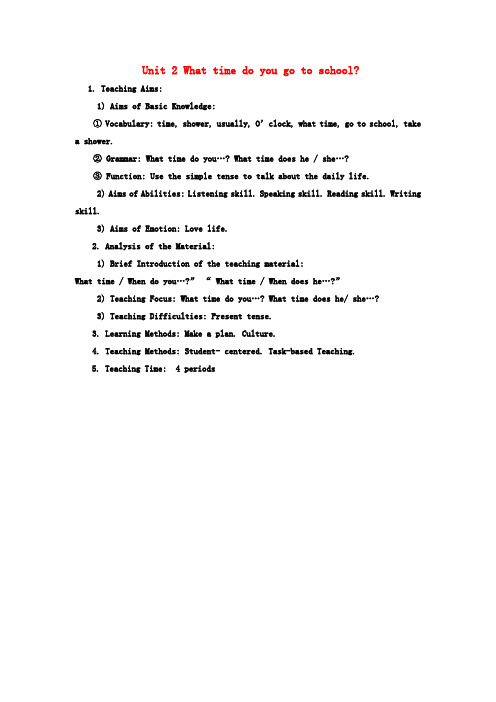
Unit 2 What time do you go to school?1. Teaching Aims:1) Aims of Basic Knowledge:① Vocabulary: time, shower, usually, O’clock, what time, go to school, takea shower.② Grammar: What time do you…? What time does he / she…?③ Function: Use the simple te nse to talk about the daily life.2) Aims of Abilities: Listening skill. Speaking skill. Reading skill. Writing skill.3) Aims of Emotion: Love life.2. Analysis of the Material:1) Brief Introduction of the teaching material:What time / When do you…?” “What time / When does he…?”2) Teaching Focus: What time do you…? What time does he/ she…?3) Teaching Difficulties: Present tense.3. Learning Methods: Make a plan. Culture.4. Teaching Methods: Student- centered. Task-based Teaching.5. Teaching Time: 4 periodsPeriod 1(Section A: 1a-2a)Step One: Warming-upGreetingT: Good afternoon, everyone.Ss: Good afternoon, Miss Yang.Step Two: Presentation1.Adjust the time, and ask students questions.T: What time is it? Ss: It’s 12 o’clock. ( Write on Bb )( Help Ss to say )T: What time is it? Ss: It’s 10:15. ( Help Ss to say )2.Ask one student to come to the front, adjust the time and ask the otherstudents.S1: What time is it? Ss: It’s 9 o’clock.3.Teach the new words & phrases.Show some pictures of different clocks and the activities.T: I’m very busy these days. Can you guess what time I get up / eat breakfast / go to school / run / take a shower? ( Write on Bb)T: I usually get up at 6:35. ( Teach Ss the new word “ usually” )S1: You usually eat breakfast at …S2: You usually run at…S3: You usually take a shower at …4.Ask Ss to do the exercise of 1a, and then check the answers.Step Three: Listening1.Show Ss the timetable of Rick’s ( write on small Bb )Rick’s timetableAsk Ss listen to the recorder and fill in the chart.Then check the answers.2.Ask and answer.T: What time does Rick get up / eat breakfast / run / go to school / take a shower ?Ss: He gets up / eats breakfast / runs / goes to school / takes a shower at…( Ask Ss pay attention to the underlined phrases.)Step Four: Consolidation1.Ask Ss to look at the pictures and tell their days.Example: I usually get up at …. I eat breakfast at …. I go to sch ool at …. At …,I take a shower.Step Six: Homework1.Try to remember all the words & phrases.2.Survey: Ask your classmates their routines, and give your report.3.Plan: January 1st is coming. Please plan it, and make your day wonderful.Step Seven Blackboard DesignReflection after class:______________________________________________________________________________ ______________________________________________________________________________ __________________________________________________________________________Period 2 (Section A: 2b-Grammar Focus)1. Aims and demands :1) Language skills :Ss learn to talk about kinds of transportation, and how longit takes to go places, and how far apart places are.2) Target Language : Words : how far , get to , bicycle , subway , bus stop, trainstation , minute, kilometer, mile , transportation , calendarSentences: How do you get to school ? / How long does it take ? / How far is it ?3) Moral object : Through learning this unit , Ss can enable them to care foreach other whenever crossing the roads and pay attention to the sign of traffic.2. Analysis of the material:Students have learned the transportation before.. In this unit ,they need to learnmore details about the transportation. At the same time ,they need to learn “How lo ng and How far” and they can use them freely.3. Teaching methods:pairwork , groupwork ,listening and speaking, practicing4, learning strategies:Personalizing Inferring vocabulary5.Teaching aids:Tape recorder, a projector or a computer6.Teaching period:Four periods.Period 3 (Section B: 3a-3c)1. Aims and Demands: Key vocabulary, How do you get to school ? How does he getto school ?2. Teaching methods : Listening Writing Pairwork3. Teaching Aids : A tape recorder.Step I Leading inT: Good morning, everyone! You know I live far away ,so I go to school by bus every day. What about you? David, “How often do you go to school?”T: So we will talk about how to get to places in this unit.Step IINow I will show you pictures and let’s review the transportations we know. Then we will learn more about it .(take the subway) Please open your books and finish 1a.Step III1. There are five names in 1b.Now they are in the picture. We should find them.2. Play the tape .They should listen carefully and find the persons .Write the numbers next to the correct students in the picture above. After listening , check the answers together .Step IVPoint to the example in the box , ask two students to read it .then ask them to make up their conversations about how the people in the picture get to school . Teacher choose some pairs to act their conversations.Step VPracticing the listening :T: I will play two conversations The people are talking about how students get to school and how long it takes .The first time check the kinds of transportation that you hear. The second time match the time with the kinds of transportation activity 2a.Step VI1. Pay attention to the picture and dialogue.2. Make your own dialogue into pairs.3. Act it in front of the students.Step VIISummary and homework: This class we have learnt some key vocabulary and the target language .I hope after class you can survey how does your friends get to school .and pre-revise the 3a,3b.Step VIII Blackboard DesignReflection after class:______________________________________________________________________________ ______________________________________________________________________________ ______________________________________________________________________________ _______Period 4。
精选七年级英语下册Unit2Whattimedoyougotoschool备课教案(新版)人教新目标版
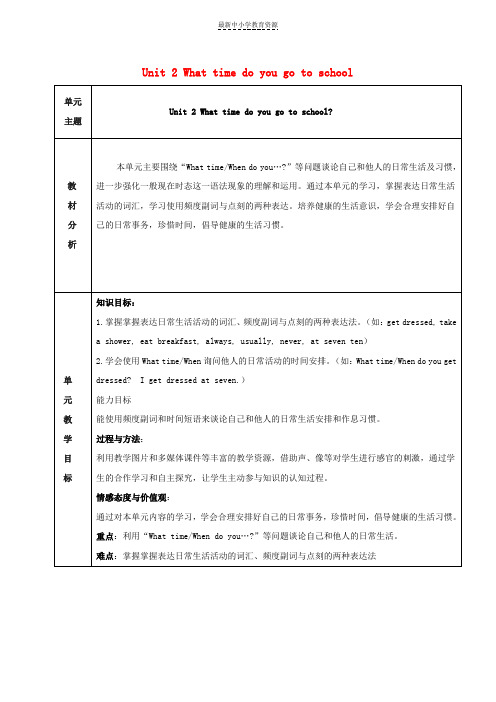
难点:掌握掌握表达日常生活活动的词汇、频度副词与点刻的两种表达法
课时安排
Period 1Section A(1a-1c)Period 2Section A(2a-1d)
Period 3Section A(Grammar Focus-3c)Period 4Section B(1a1e)
Period 5Section B(3aSelf Check)
单
元
教
学ቤተ መጻሕፍቲ ባይዱ
目
标
知识目标:
1.掌握掌握表达日常生活活动的词汇、频度副词与点刻的两种表达法。(如:get dressed, take a shower, eat breakfast, always, usually, never, at seven ten)
2.学会使用What time/When询问他人的日常活动的时间安排。(如:What time/When do you get dressed? I get dressed at seven.)
能力目标
能使用频度副词和时间短语来谈论自己和他人的日常生活安排和作息习惯。
过程与方法:
利用教学图片和多媒体课件等丰富的教学资源,借助声、像等对学生进行感官的刺激,通过学生的合作学习和自主探究,让学生主动参与知识的认知过程。
情感态度与价值观:
通过对本单元内容的学习,学会合理安排好自己的日常事务,珍惜时间,倡导健康的生活习惯。
Unit 2 What time do you go to school
单元
主题
Unit 2 What time do you go to school?
人教新目标版七年级英语下册Unit2WhattimedoyougotoschoolSectionAGrammarFocus_3c教案新版
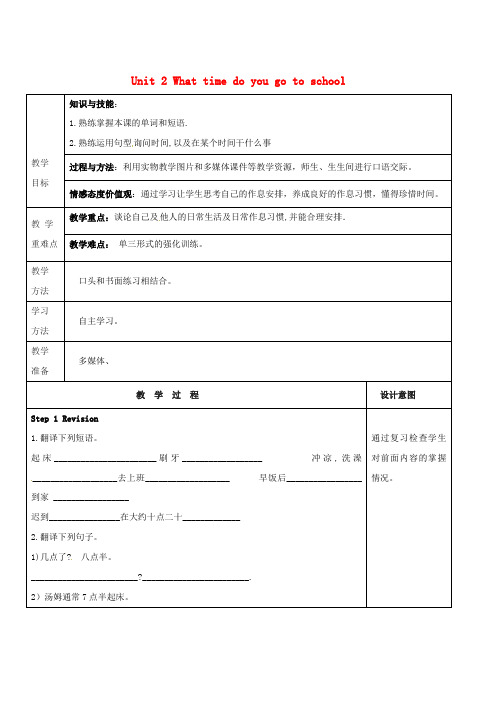
1.自主完成3a,生生相互纠错、改正。
2.Write about something you always do,something you usually do and something you never do.
Step 3.课堂练习
I usually _______(起床)at _______. I have milk and bread for breakf ast. After breakfast, I _______(洗澡)and then I _______(上学)by b us. I get to school at _______ I have five classes in the morning. And then I have lun ch at ________. In the afternoon I have two classes. I _______(回家)at _______. I get home at 4:30 p.m. I _______(吃晚饭)at about _______. After dinner, I _______(做作业). I _______(睡觉)at _______. My life is busy but not excitin g.
3)我通常七点五十的洗澡。
I ______ go ________ work ________ eight--thirty.
4)Scott什么时候去工作?
________ ________ Scott ________ ________ ________?
5)他们通常在周末锻炼。
They usually __________ __________ ________ .
人教版新目标英语七年级下册《Unit 2 What time do you go to school

人教版新目标英语七年级下册《Unit 2 What time do you go to school》优秀教学设计2一. 教材分析人教版新目标英语七年级下册《Unit 2 What time do you go to school》主要讲述了日常生活中关于时间的基本表达方式。
通过本单元的学习,学生能够掌握一般现在时态的疑问句和回答,以及询问和描述日常活动的时间。
教材以真实的生活场景为背景,让学生在实际语境中学习、练习和应用英语,提高他们的语言运用能力。
二. 学情分析七年级的学生已经掌握了基本的英语语法知识和一定数量的词汇,具备一定的听、说、读、写能力。
但部分学生对英语学习的兴趣不足,学习积极性有待提高。
此外,学生之间在学习上的差距较大,有的学生英语基础较薄弱,需要更多的关注和辅导。
三. 教学目标1.知识目标:学生能够掌握一般现在时态的疑问句和回答,正确运用动词短语描述日常活动的时间。
2.能力目标:学生能够在实际语境中听、说、读、写关于时间的表达,提高语言运用能力。
3.情感目标:激发学生学习英语的兴趣,培养他们积极向上的学习态度,增强自信心。
四. 教学重难点1.重点:学生能够运用一般现在时态的疑问句和回答,描述日常活动的时间。
2.难点:学生能够在实际语境中正确运用动词短语,灵活表达关于时间的句子。
五. 教学方法1.情境教学法:通过设定真实的生活场景,让学生在实际语境中学习、练习和应用英语。
2.交际法:鼓励学生积极参与课堂交流,提高他们的听说能力。
3.任务型教学法:通过完成具体任务,让学生在实践中掌握语言知识,提高语言运用能力。
六. 教学准备1.教师准备:备好相关教学材料,如PPT、图片、实物等。
2.学生准备:预习本节课的内容,了解一般现在时态的疑问句和回答。
七. 教学过程1.导入(5分钟)教师通过提问学生日常生活中的一些活动,如“What do you like to do in your free time?”,引导学生用英语进行回答。
人教版新目标英语七年级下册《Unit 2 What time do you go to school
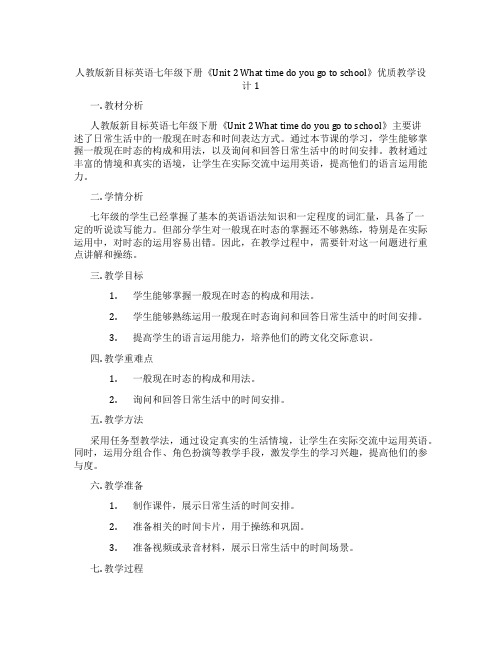
人教版新目标英语七年级下册《Unit 2 What time do you go to school》优质教学设计1一. 教材分析人教版新目标英语七年级下册《Unit 2 What time do you go to school》主要讲述了日常生活中的一般现在时态和时间表达方式。
通过本节课的学习,学生能够掌握一般现在时态的构成和用法,以及询问和回答日常生活中的时间安排。
教材通过丰富的情境和真实的语境,让学生在实际交流中运用英语,提高他们的语言运用能力。
二. 学情分析七年级的学生已经掌握了基本的英语语法知识和一定程度的词汇量,具备了一定的听说读写能力。
但部分学生对一般现在时态的掌握还不够熟练,特别是在实际运用中,对时态的运用容易出错。
因此,在教学过程中,需要针对这一问题进行重点讲解和操练。
三. 教学目标1.学生能够掌握一般现在时态的构成和用法。
2.学生能够熟练运用一般现在时态询问和回答日常生活中的时间安排。
3.提高学生的语言运用能力,培养他们的跨文化交际意识。
四. 教学重难点1.一般现在时态的构成和用法。
2.询问和回答日常生活中的时间安排。
五. 教学方法采用任务型教学法,通过设定真实的生活情境,让学生在实际交流中运用英语。
同时,运用分组合作、角色扮演等教学手段,激发学生的学习兴趣,提高他们的参与度。
六. 教学准备1.制作课件,展示日常生活的时间安排。
2.准备相关的时间卡片,用于操练和巩固。
3.准备视频或录音材料,展示日常生活中的时间场景。
七. 教学过程1.导入(5分钟)通过提问学生日常生活中的时间安排,引导学生思考和讨论。
如:“What time do you get up?”“What time do you go to school?”等。
2.呈现(10分钟)利用课件展示一般现在时态的构成和用法,同时呈现日常生活中的一般现在时态句子。
如:“I get up at 7 o’clock.”“He goes to school at 8 o’clock.”等。
(完整版)新版新目标七下Unit2Whattimedoyougotoschool知识点及习题,推荐文档

Unit 2 What time do you go to school?一、重点词汇1.词形变化:(1)d ress v.穿衣服—________n. 连衣裙—_____(复数)(2)b rush v.刷;刷净—________(三单形式)—________n.牙刷(3)t ooth n.牙齿—________(复数)(4)s how v.展示;&n.节目—________v&n.沐浴;沐浴器(5)s hower v.沐浴;洗澡=________=________(同义词)(6)f our num, 四—________十四—________四十(7)f ive num.五—________十五—________五十(8)e arly adj.&adv. 早(的),提前(的)—________(反义词)(9)s top v.&n.停止;站台=________n. 车站(近义词)(10)job n. 工作;职业=________v.&n.工作(近义词)—________n.工人(11)exercise v. &n.—________(三单形式)—________(现在分词形式)—________(不可数名词)锻炼;运动—________(可数名词复数)练习;操(12)good adj. —________adv. —________(比较级、最高级)(13)15 minutes = _________一刻钟;15分钟(同义词)(14)30 minutes =__________半小时(同义词)(15)60 minutes = _________ 一个小时(同义词)(16)run v.跑—________(现在分词)—________n.跑步者(17)clean v.打扫;清除;&adj.干净的—________adj.肮脏的(反义词)(18)walk v.&n.步行;行走=________(介词短语)(19)walk v.散步=________=________=________(同义词)(20)quick adj.快的;迅速的—________adv. 很快地—________(反义词)(21)taste v. 品尝;有……的味道;&n.味道;滋味—________adj.美味的;可口的(22)live v.生活—________n.生活;生命—________(复数形式)(23)sometimes adv.=___________有时;不时(同义词)(24)lots of 大量的;许多的=____________(同义词)(25)exercise v,锻炼;做运动=____________(同义词)(26)be late for =____________(同义词)因……而迟到(27)health n.健康—________adj.健康的—________adj.不健康的(反义词)(28)after prep.&conj.在……之后—________(反义词)2.重点单词:(1)频度副词:always, usually, often, sometimes, never等(2)e xercise的用法;(3)e ither的用法3.易错知识点(1)W hen与What time的区别运用when与what time都可以用来询问时间,相当于汉语的“什么时候”,它们之间的异同点如下:1)询问做某事的具体时间(钟点)时两者可以互换如:你什么时候去上学?— When / What time do you go to school?—I go to school at seven o’clock.2) 询问钟表所显示的时间时,只能用what timee.g. —What time is it? (=What’s the time) 几点了? —It’s eigh t thirty.八点半。
新版新目标七下Unit_2_What_time_do_you_go_to_school知识点及习题

Unit 2 What time do you usually go to school?一、重点词汇(1)起床__________(2)去上学__________(3)去工作__________(4)穿衣服__________(5)刷牙__________(6)吃早餐__________(7)吃午餐__________(8)吃晚餐__________(9)洗澡;沐浴__________(10)去散步__________(11)几点钟__________(12)在6:30__________(13)半小时__________(14)一刻钟__________(16)一个小时__________(17)起床早_________(18)有一份有趣的工作__________ (19)广播电台__________(20)从……到……__________ (22)在早餐/午餐/晚餐时间______ (23)那之后__________(24)放学后__________(25)下课后__________(26)快速地吃__________ (27)上课迟到__________(29)(上学迟到__________(31)在周末__________(32)在学校上课日的晚上__________ (33)好朋友/最好的朋友__________ (36)在早上/下午/晚上_______________(38)在星期天(早上)__________ (39)回家__________(40)到家__________(41)做…..家庭作业__________ (42)打扫房间__________(43)上床睡觉__________(44)吃冰淇淋__________(45)吃蔬菜__________(46)做运动_____________(47)许多__________(48)要么……要么……__________ (49)玩电脑游戏__________(50)许多的;大量的___________ (52)水果和蔬菜___________(53)味道不错___________(55)放学回家___________二、必背句子(尝试翻译一下下列句子)1.What time do you usually get up?--- I usually get up at six thirty.2. What time does Rick eat breakfast? --He eats breakfast at seven o’clock.3. What time do they get dressed?-- They always get dressed at seven twenty.4. When do your friends exercise? --They usually exercise on weekends.5. When does Scott go to work? --He always goes to work at eleven o’clock.6. That’s a funny time for breakfast!7. I don’t have much time for breakfast, so I usually eat very quickly.8.I sometimes play basketball for half an hour.9. In the evening, I either watch TV or play computer games.10. After that, she goes to school at eight thirty.11 At twelve, she eats lots of fruit and vegetables for lunch.12. She knows it’s not good for her, but it tastes good.三、按要求改写句子.1. Alicia takes a shower at 9:00.(提问划线部分提问)__________________________2. Mary takes a shower at 8:00.(变一般疑问句) ________ Mary ________ a shower at 8:00?3. I usually go to bed at 10:00.(变否定句)I _______ usually _______to bed at 10:00.4. She often runs in the morning.(对划线部分提问)________ _________ she often _________?5. I usually get up at five o’clock every day. (对划线部分提问)________ _________ ________ you get up every day?四、单选题1. —What time is it ? —It’s ___ 7:00. We often have breakfast ____7:00A. at, atB. /, atC. at, /2. —My parents ask me to finish my homework _____ after school. —It's a good habit.A.one B.first C.ones D.once3. That’s a funny time ______ breakfast! A. for B. in C. on4. Scott has _____ interesting job. A. an B. a C. /5. I go to _____ work after _____ breakfast every day. A. /, the B. /, / C. the, /6. What time does Linda _______ after school?A. do her homeworkB. does her homeworkC. do her homeworks7. When do you _______ every day? A. go to home B. go home C. go a home8 Ice-cream is not good for us, but it tastes _______.A. well B. good C. bad9. —Either you or she ________ on duty today, don't forget it. —OK, I won't.A.is B.am C.are D.be10. You can either take a bus ______ go there on foot. A. and B. or C. but五、根据汉语意思完成下列句子,每空一词。
- 1、下载文档前请自行甄别文档内容的完整性,平台不提供额外的编辑、内容补充、找答案等附加服务。
- 2、"仅部分预览"的文档,不可在线预览部分如存在完整性等问题,可反馈申请退款(可完整预览的文档不适用该条件!)。
- 3、如文档侵犯您的权益,请联系客服反馈,我们会尽快为您处理(人工客服工作时间:9:00-18:30)。
Unit 2 What time do you go to school?一、重点词汇1.词形变化:(1)d ress v.穿衣服—________n. 连衣裙—_____(复数)(2)b rush v.刷;刷净—________(三单形式)—________n.牙刷(3)t ooth n.牙齿—________(复数)(4)s how v.展示;&n.节目—________v&n.沐浴;沐浴器(5)s hower v.沐浴;洗澡=________=________(同义词)(6)f our num, 四—________十四—________四十(7)f ive num.五—________十五—________五十(8)e arly adj.&adv. 早(的),提前(的)—________(反义词)(9)s top v.&n.停止;站台=________n. 车站(近义词)(10)job n. 工作;职业=________v.&n.工作(近义词)—________n.工人(11)exercise v. &n.—________(三单形式)—________(现在分词形式)—________(不可数名词)锻炼;运动—________(可数名词复数)练习;操(12)good adj. —________adv. —________(比较级、最高级)(13)15 minutes = _________一刻钟;15分钟(同义词)(14)30 minutes =__________半小时(同义词)(15)60 minutes = _________ 一个小时(同义词)(16)run v.跑—________(现在分词)—________n.跑步者(17)clean v.打扫;清除;&adj.干净的—________adj.肮脏的(反义词)(18)walk v.&n.步行;行走=________(介词短语)(19)walk v.散步=________=________=________(同义词)(20)quick adj.快的;迅速的—________adv. 很快地—________(反义词)(21)taste v. 品尝;有……的味道;&n.味道;滋味—________adj.美味的;可口的(22)live v.生活—________n.生活;生命—________(复数形式)(23)sometimes adv.=___________有时;不时(同义词)(24)lots of 大量的;许多的=____________(同义词)(25)exercise v,锻炼;做运动=____________(同义词)(26)be late for =____________(同义词)因……而迟到(27)health n.健康—________adj.健康的—________adj.不健康的(反义词)(28)after prep.&conj.在……之后—________(反义词)2.重点单词:(1)频度副词:always, usually, often, sometimes, never等(2)e xercise的用法;(3)e ither的用法3.易错知识点(1)W hen与What time的区别运用when与what time都可以用来询问时间,相当于汉语的“什么时候”,它们之间的异同点如下:1)询问做某事的具体时间(钟点)时两者可以互换如:你什么时候去上学?— When / What time do you go to school?—I go to school at seven o’clock.2) 询问钟表所显示的时间时,只能用what timee.g. —What time is it? (=What’s the time) 几点了? —It’s eigh t thirty.八点半。
3)询问事件发生的年份、月份、日期等非非钟点性时间时,只能用when, 而不能用what time。
e.g. —When is your birthday? —My birthday is February 6th.—When is Teachers’ Day?—It’s September 10th.[总结]: What time 几点了?准确到分,When 的范围比较大。
(2)介词at, in, on表时间的用法(3)j ob与work的区别运用;(4)d ress, wear, put on, in表“穿衣”的用法;二、重点短语(1)起床__________(2)去上学__________(3)去工作__________(4)穿衣服__________(5)刷牙__________(6)吃早餐__________(7)吃午餐__________(8)吃晚餐__________(9)洗澡;沐浴__________(10)去散步__________(11)几点钟__________(12)在6:30__________(13)半小时__________(14)一个半小时__________(15)一刻钟__________(16)一个小时__________(17)起床早/晚__________(18)有一份有趣的工作__________ (19)在广播电台__________(20)广播节目__________(21)从……到……__________(22)在早餐/午餐/晚餐时间__________ (23)那之后__________(24)放学后__________(25)下课后__________(26)快速地吃__________(27)因……而迟到__________(28)上班迟到__________(29)上课迟到__________(30)上学迟到__________(31)在周末__________(32)在工作日__________ (33)在学校上课日__________(34)在学校上课日的晚上__________ (35)好朋友/最好的朋友__________ (36)在某个小组__________(37)在早上/下午/晚上__________ (38)在星期天(早上)__________ (39)回家__________(40)到家__________(41)做某人的家庭作业__________ (42)打扫某人的房间__________(43)上床睡觉__________(44)吃冰淇淋__________(45)吃蔬菜__________(46)做运动_____________(47)有许多时间(做某事)__________ (48)要么……要么……__________ (49)玩电脑游戏__________(50)吃一份不错的早餐_________ (51)许多的;大量的___________ (52)水果和蔬菜___________(53)早餐/午餐/晚餐后___________ (54)味道不错___________(55)健康/不健康的习惯___________ (56)放学回家___________(57)有一个非常健康的生活___________ (58)有一口好牙___________(59)这是……___________(60)从周一至周五___________(61)到达学校___________(62)为某人做早餐/午餐/晚餐___________ (63)上午第一节课___________(64)保持健康___________三、重点句型I.句型结构:1. What do/does sb. usually do on weekends?1.—What time do/does sb. do sth.?(询问“具体时间”)—Sb. do/does sth. at+具体时刻.2.—When do/does sb. do sth.? (询问笼统的时间或星期、日期、季节等)—Sb. do/does sth. in/on/at+时间.4. It’s + adj. +(for sb.) +to do sth.对某人来说做某事是怎样的。
II.必背句子1.What time do you usually get up? I usuallyget up at six thirty.2. What time does Rick eat breakfast? He eats breakfast at seven o’clock.3. What time do they get dressed? They always get dressed at seven twenty.4. When do your friends exercise? They usually exercise on weekends.5. When does Scott go to work? He always goes to work at eleven o’clock.6. That’s a funny time for breakfast!7. I don’t have much time for breakfast, so I usually eat very quickly.8.I sometimes play basketball for half an hour.9. When I get home, I always do my homework first.10. In the evening, I either watch TV or play computer games.11. I brush my teeth and then I go to bed.12. After that, she goes to school at eightthirty.13. At twelve, she eats lots of fruit and vegetables for lunch.14. She knows it’s not good for her, but it tastes good.15. In the evening, she does her homework and usually swims or takes a walk.16. I get home from school at half past four and do my homework. 17. I have a very healthy life.18. You need to brush your teeth after eating to have good teeth.19. Here are your clothes. Go and get dressed quickly.20. I don’t have time to clean my room from Monday to Friday. So I clean it on weekends.21. She is never late for the first class in the morning.四、重点语法(一)时间表达法1. “顺读法”:使用数字(________数+________数)。
